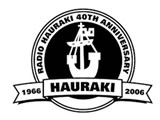What happened that day?
See historic events for any day of the year by entering the date below. Why not try your birthday?
Kiwi of the Week
Today in History

1966 Radio Hauraki rules the waves
The state monopoly on commercial radio broadcasting was challenged by the pirate station Radio Hauraki's first scheduled transmission from the vessel Tiri in the Colville Channel.
The brainchild of Wellington journalist David Gapes, Hauraki aimed to challenge the ‘stuffy and censorious’ state broadcaster, the NZBC (New Zealand Broadcasting Corporation). When attempts to secure a private broadcasting licence failed, the decision was made to broadcast offshore. There was international precedent for such a move. Radio Caroline, a pirate radio ship in the North Sea, had taken on the BBC in Britain. Young Britons were having the same struggle as young Kiwis, with state-controlled broadcasting holding little appeal.
By August Radio Hauraki had found its transmission vessel, the MV Tiri. The venture had a number of legal hurdles to overcome and the ship was forcibly prevented from leaving Auckland Harbour by the authorities. A court hearing in November finally cleared the way for the Tiri to depart for its new location, the Colville Channel between Great Barrier Island and the Coromandel Peninsula.
Test transmissions began in earnest on the evening of 1 December. The station jingle rang out loud and clear: ‘Radio Hauraki, Top of the Dial’. DJ Bob Leahy announced, ‘You're listening to Radio Hauraki, Top of the Dial, and we're broadcasting a test transmission on 1480’. The difficulties of broadcasting at sea hit home later that evening when strong winds knocked out the huge transmitter mast on the Tiri and put Hauraki off the air.
Around 9 a.m. on Sunday 4 December on-air tests started up again. At 11 a.m. Hauraki's scheduled broadcast began. Listeners heard the sound of seagulls before a pre-recorded documentary introduced the Hauraki story and its people. The first song played was Matt Munro's somewhat symbolic (but certainly not rebellious) 'Born free'.
Over the next three and a half years there were further legal challenges and a number of incidents at sea that tested the resolve of those involved. Listeners were treated to a ‘blow-by-blow’ commentary of the demise of the Tiri when it hit rocks on Great Barrier Island in January 1968. A replacement vessel, the Kapuni (dubbed Tiri II), also ran aground on several occasions.
In March 1970 the Broadcasting Authority rejected the NZBC's claims against private broadcasting and awarded two private broadcasting licences for the Auckland area to Radio Hauraki and its long-time rival Radio i. Hauraki's last broadcast as a pirate station was on 1 June 1970. ‘Born free’ closed the transmission. It proved to be a bittersweet moment. On the return voyage to Auckland that evening, announcer Rick Grant was lost overboard.
The New Zealand radio scene today is vastly different from 1966. From state-controlled radio with a few stations, there is now a crowded, highly competitive commercial market.
Image: Radio Hauraki 40th anniversary logo (Radio Heritage Foundation)




















